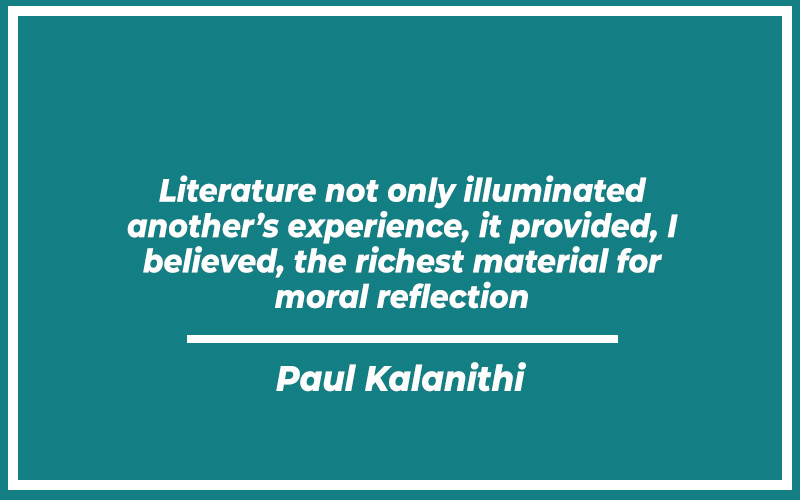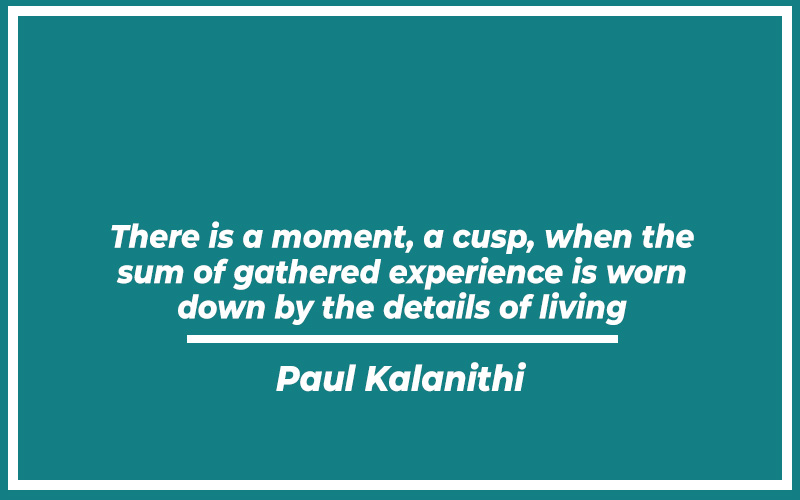If you’ve ever pondered the fragility of life and the pursuit of meaning within it, then the poignant memoir “When Breath Becomes Air” by Paul Kalanithi is something you should delve into.
This book offers a profound look at the life of a neurosurgeon who faced terminal cancer, capturing his reflections on dying and the essence of what it truly means to live.
The quotes from this touching work will challenge you to think deeply about mortality, personal purpose, and the intersections of science and spirituality. Each passage invites you to examine the values that guide your own life and the legacies we leave behind.
Best When Breath Becomes Air Quotes
“Death comes for all of us. For us, for our patients: it is our fate as living, breathing, metabolizing organisms. Most lives are lived with passivity toward death—it’s something that happens to you and those around you.” – Paul Kalanithi
Paul Kalanithi reflects on the inevitability of death, emphasizing its universality and the often passive approach people take towards it. His insight challenges us to consider how we confront our mortality and the lives of those we affect.
The quote urges healthcare professionals to engage actively with the realities of death, blending personal responsibility with professional duty.
Also Read: Cheryl Strayed Quotes (with Explanation)

“Literature not only illuminated another’s experience, it provided, I believed, the richest material for moral reflection.” – Paul Kalanithi
Paul Kalanithi praises literature for its ability to enlighten and provoke moral contemplation. He contrasts his experience with the abstract nature of formal ethics, finding that literature more effectively captures the complexities of human life.
This commentary speaks to the power of stories in shaping our understanding of the world and ourselves, suggesting that through literature, we can gain deeper insights into life’s moral and ethical dilemmas.
“I will share your joy and sorrow / Till we’ve seen this journey through.” – Paul Kalanithi
Here, Kalanithi expresses a deep commitment to sharing in the experiences of others, reflecting a fundamental aspect of empathy and connection.
This line from a poem he wrote underscores the importance of companionship and support through all of life’s phases, highlighting the human need for shared experiences and mutual support, especially in the face of life’s challenges.
“Everyone succumbs to finitude… Most ambitions are either achieved or abandoned; either way, they belong to the past.” – Paul Kalanithi
Kalanithi addresses the concept of finitude and the temporal nature of human ambitions. He suggests that as we age, our focus shifts from future aspirations to living in the present, where the accumulation of past achievements and unmet goals blend into our current existence.
This perspective invites us to reflect on how we measure our lives and what ultimately holds value as we face our own impermanence.
“Human knowledge is never contained in one person. It grows from the relationships we create between each other and the world, and still it is never complete.” – Paul Kalanithi
This quote highlights the collaborative and ever-evolving nature of knowledge. Kalanithi suggests that our understanding of the world is enhanced through our interactions with others, emphasizing that learning is a continuous, shared process.
This view encourages us to value our relationships and the collective insights they produce, reminding us of the interconnectedness of our intellectual and social lives.
“You can’t ever reach perfection, but you can believe in an asymptote toward which you are ceaselessly striving.” – Paul Kalanithi
Kalanithi speaks to the human pursuit of perfection and the philosophical concept of continually striving toward an unreachable ideal.
This quote reflects on the relentless human effort to improve and achieve, despite knowing that absolute perfection is unattainable. It inspires a dedication to perpetual growth and improvement in both personal and professional realms.
“The secret is to know that the deck is stacked, that you will lose, that your hands or judgment will slip, and yet still struggle to win for your patients.” – Paul Kalanithi
This profound reflection encapsulates the challenges and responsibilities of medical professionals. Kalanithi acknowledges the inevitable limitations and failures in medicine, yet he underscores the importance of continuous effort and dedication to patient care.
This quote serves as a poignant reminder of the resilience and commitment required in the face of life’s uncertainties and the inescapable reality of mortality.
“Even if I’m dying, until I actually die, I am still living.” – Paul Kalanithi
Paul Kalanithi’s words highlight the distinction between the state of dying and the act of living, emphasizing the importance of embracing life fully, regardless of its temporal boundaries.
This quote encourages us to live purposefully and meaningfully up to the very end, regardless of our circumstances, reminding us that life retains its value and potential for joy even in the face of death.
“Those burdens are what make medicine holy and wholly impossible: in taking up another’s cross, one must sometimes get crushed by the weight.” – Paul Kalanithi
In this poignant observation, Kalanithi reflects on the profound emotional and ethical weight that medical professionals carry. He articulates the sacredness of their duty to heal and comfort, acknowledging the heavy toll it can take on those who bear the responsibility.
This quote invites us to appreciate the complex interplay of compassion and challenge in the practice of medicine, highlighting the dedication required to undertake such a calling.
“The secret is to know that the deck is stacked, that you will lose, and yet still struggle to win for your patients.” – Paul Kalanithi
Here, Kalanithi addresses the inherent challenges and limitations within the medical field, suggesting that awareness of inevitable losses should not deter a doctor’s effort to fight for their patients’ lives.
This quote underlines the resilience needed in medicine, pushing for perseverance and relentless effort in the face of predictable adversity.
“Science may provide the most useful way to organize empirical, reproducible data, but its power to do so is predicated on its inability to grasp the most central aspects of human life: hope, fear, love, hate, beauty, envy, honor, weakness, striving, suffering, virtue.” – Paul Kalanithi
Kalanithi critiques the limitations of science in comprehending the full spectrum of human experience. He argues that while science is invaluable for understanding the physical world, it falls short in capturing the essence of what it means to live a human life.
This commentary challenges us to recognize the boundaries of scientific inquiry and the importance of other forms of knowledge in understanding our deeper selves.
“Severe illness wasn’t life-altering, it was life-shattering.” – Paul Kalanithi
Kalanithi describes the profound impact of severe illness on a person’s life, expressing that it does more than change life’s course—it completely dismantles it.
This quote brings attention to the devastating effects of critical illness, not just physically but on one’s identity and future, highlighting the deep existential challenges faced by those who endure such conditions.
“The fact of death is unsettling. Yet there is no other way to live.” – Paul Kalanithi
Kalanithi confronts the paradox of mortality, acknowledging that while death is a disquieting certainty, it is also a fundamental part of life.
This statement encourages acceptance of death as essential to the human condition, urging us to live fully with the awareness of our mortality, thus enriching our appreciation for every moment.
“I don’t believe in the wisdom of children, nor in the wisdom of the old. There is a moment, a cusp, when the sum of gathered experience is worn down by the details of living. We are never so wise as when we live in the moment.” – Paul Kalanithi
This quote explores the idea that true wisdom lies not in age but in one’s capacity to be present in the moment, fully engaged with life as it unfolds.
Kalanithi suggests that the most profound insights come when we are fully immersed in our experiences, free from the burdens of past knowledge or future anticipations.
“That message is simple: When you come to one of the many moments in life when you must give an account of yourself, provide a ledger of what you have been, and done, and meant to the world, do not, on that day, shrink from the truth—think it, speak it, and live it with integrity.” – Paul Kalanithi
Paul Kalanithi emphasizes the importance of living with integrity and truthfulness. This quote encourages us to consider how we’ll reflect on our actions and their impact at life’s critical junctures. Kalanithi advocates for an honest self-assessment, suggesting that facing our truths without shrinking away is essential to living authentically.
His words prompt us to integrate sincerity in our daily lives, ensuring that when we look back, we do so with pride and without regret.
“The defining characteristic of the human condition might be that we have to take life seriously, but paradoxically, not too seriously.” – Paul Kalanithi
Paul Kalanithi articulates the paradox at the heart of human existence: the balance between regarding life with seriousness and maintaining a sense of humor about it. This perspective suggests that while our decisions and actions require thoughtful consideration, adopting an overly grave approach can detract from the joy of living.
Kalanithi invites us to engage deeply with life’s responsibilities while also enjoying its lighter moments, promoting a well-rounded approach to navigating the complexities of life.
“A tureen of tragedy was best allotted by the spoonful.” – Paul Kalanithi
Paul Kalanithi uses a culinary metaphor to suggest a method for managing life’s challenges: taking them one small piece at a time. This approach to handling personal difficulties implies that moderating our emotional and practical responses to hardship can make overwhelming situations more manageable.
His advice underscores the importance of pacing ourselves through life’s darker periods, emphasizing resilience and the need for careful, deliberate engagement with our problems.
“It turns out that it is not where but who you are with that really matters.” – Paul Kalanithi
Paul Kalanithi reflects on the essence of personal happiness and fulfillment, emphasizing the importance of relationships over location. This quote suggests that our connections with others provide the most significant contributions to our well-being, rather than our physical surroundings.
It highlights the value of nurturing relationships and cherishing the people who support and enrich our lives, prompting us to prioritize and appreciate these connections above all.
“Books became my closest confidants, finely ground lenses providing new views of the world.” – Paul Kalanithi
Paul Kalanithi expresses his deep connection to books, describing them as instruments that broadened his understanding of the world. This quote celebrates the power of literature to serve as both companions and gateways to new perspectives, enriching the reader’s life with diverse insights and experiences.
It underscores the transformative potential of reading and encourages us to view books as valuable tools for education, reflection, and personal growth.
“Even if I’m dying, until I actually die, I am still living.” – Paul Kalanithi
Paul Kalanithi’s powerful statement on life and death reminds us to embrace life fully until the very end. This quote challenges us to continue living with purpose and engagement, regardless of the proximity of death.
It serves as a poignant reminder to cherish and make the most of every moment, encouraging a proactive and vibrant approach to life, even in the face of mortality.
“There is a moment, a cusp, when the sum of gathered experience is worn down by the details of living.” – Paul Kalanithi
Paul Kalanithi reflects on the transformative moments in life when accumulated experiences intersect with the daily realities, shaping our understanding and actions.
This quote invites us to be mindful of these pivotal times, suggesting they are crucial in defining who we are and how we live. It encourages a conscious awareness of how our past shapes our present, urging us to appreciate and learn from these critical junctures in our lives.
“That message is simple: When you come to one of the many moments in life when you must give an account of yourself, provide a ledger of what you have been, and done, and meant to the world, do not, on that day, shrink from the truth—think it, speak it, and live it with integrity.” – Paul Kalanithi
Paul Kalanithi stresses the importance of integrity and authenticity when reflecting on one’s life. This quote underscores the inevitability of facing moments that demand a self-assessment of our actions and their impact.
It challenges us to approach these reckonings with honesty, urging us to live in a way that aligns with our deepest values and to articulate our truths without reservation. Kalanithi’s words encourage a commitment to personal authenticity, promoting a life lived with sincerity and moral clarity.
“The defining characteristic of the human condition might be that we have to take life seriously, but paradoxically, not too seriously.” – Paul Kalanithi
Paul Kalanithi captures the essential paradox of life: the need to engage with it seriously, yet not so seriously that it stifles our joy and spontaneity. This quote highlights the balance necessary between managing life’s responsibilities and maintaining the freedom to experience joy and lightness.
Kalanithi invites us to navigate life with a dual awareness that honors both the weight of our decisions and the pleasures of living, suggesting that understanding this balance is key to a fulfilling human experience.
“A tureen of tragedy was best allotted by the spoonful.” – Paul Kalanithi
Paul Kalanithi offers a metaphor suggesting that dealing with life’s hardships should be done incrementally. By likening tragedy to a dish best served in small portions, he advises us to manage our challenges in manageable increments, preventing them from becoming overwhelming.
This approach not only makes larger problems more tractable but also preserves our ability to cope effectively without becoming consumed by distress. It is a reminder that patience and gradual engagement are vital strategies in facing life’s difficulties.
“It turns out that it is not where but who you are with that really matters.” – Paul Kalanithi
Paul Kalanithi reflects on the significance of relationships over location, positing that our companions influence our happiness more than our physical environment. This insight encourages us to prioritize and nurture relationships that bring meaning and joy into our lives.
It’s a reminder that the essence of a fulfilling life often resides in the connections we make with others, rather than the external settings in which we find ourselves.
“Books became my closest confidants, finely ground lenses providing new views of the world.” – Paul Kalanithi
Paul Kalanithi describes books as transformative tools that offer new perspectives and deep insights. This quote celebrates reading as a means of exploring complex ideas and gaining a broader understanding of the world.
Kalanithi’s analogy of books as “finely ground lenses” underscores their power to clarify and magnify our understanding of life’s intricacies. It encourages us to embrace literature as a vital source of knowledge, companionship, and inspiration.
“Even if I’m dying, until I actually die, I am still living.” – Paul Kalanithi
Paul Kalanithi’s declaration serves as a powerful affirmation of life, emphasizing the importance of living fully, regardless of the circumstances. This quote challenges us to remain engaged with life’s activities and joys until the very end, advocating for a robust participation in life despite its impermanence.
Kalanithi’s perspective encourages a relentless embrace of living, urging us to make the most of every moment.

“There is a moment, a cusp, when the sum of gathered experience is worn down by the details of living.” – Paul Kalanithi
Paul Kalanithi speaks to the transformative potential inherent in the accumulation of life experiences. He suggests that there is a pivotal moment when our past experiences converge with the present realities, significantly shaping our perspective and actions.
This quote invites us to be attentive to these critical junctures, where our understanding of life deepens and evolves. It’s a call to value and learn from the myriad experiences we accumulate, recognizing their power to influence and define our paths.
Also Read: Aura Quotes (with Explanation)
Final Thoughts
“When Breath Becomes Air” isn’t just a narrative about facing death; it’s a compelling invitation to live one’s life fully and meaningfully. As you reflect on Paul Kalanithi’s words, let them inspire you to consider how you engage with the world, cherish your relationships, and pursue your passions.
Remember, this memoir underscores the unpredictable nature of life and the importance of finding your own path to personal fulfillment and contribution.
Let these insights motivate you to live with intention and grace, no matter how much time you have.

